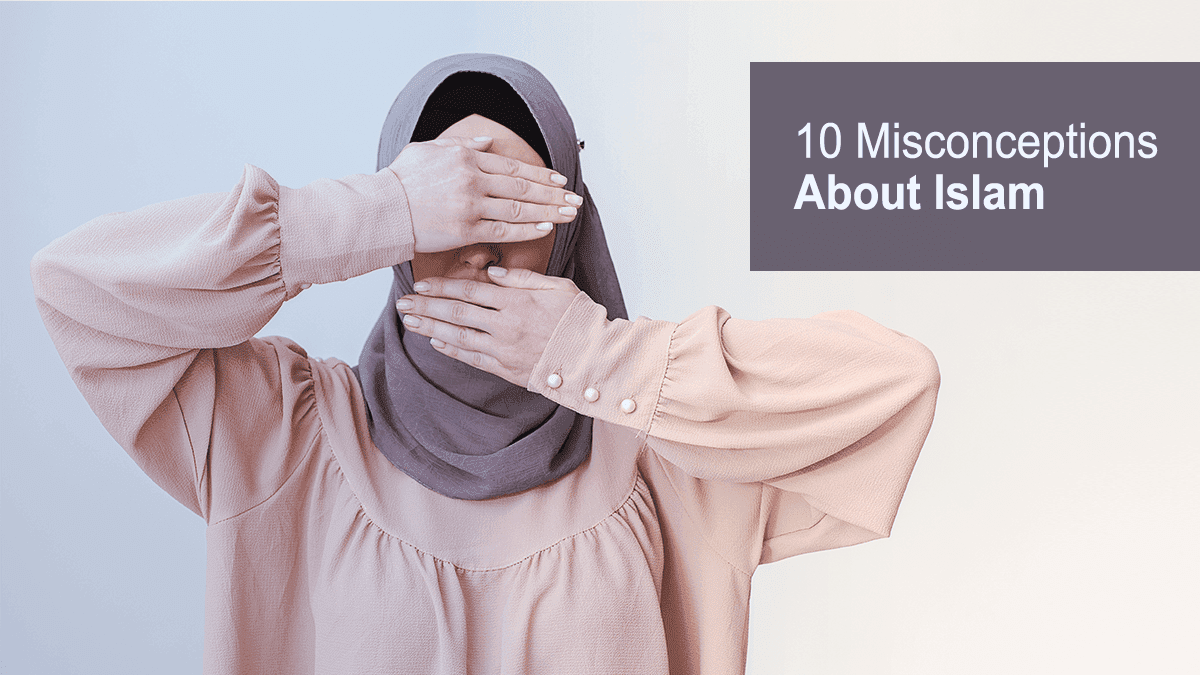This article addresses 10 common misconceptions about Islam that are often perpetuated in the media and society. One of the most prevalent misconceptions is that Islam promotes violence, when in fact the religion’s central principles emphasize peace and harmony. Another misconception is that Islam oppresses women, when in reality the religion places great emphasis on women’s rights and dignity. Additionally, many people erroneously believe that Muslims worship a different God from other religions, that Islam is a monolithic religion with a single set of beliefs and practices, and that all Muslim women wear the hijab. The article also dispels myths about Islam being anti-Semitic, all Muslims being Arab, Islam being a medieval religion, Islam being a political ideology, and all Muslims being extremists.
1. Islam Promotes Violence
One of the biggest misconceptions about Islam is that it promotes violence, which is often linked to terrorism in the media. However, this is simply not true. Islam holds peace and harmony as its central guiding principles, and the vast majority of Muslims are peaceful people who reject extremism and terrorism.
2. Islam is a Religion of Oppression
Another common misconception about Islam is that it is a religion of oppression, particularly towards women. While it is true that some Muslim-majority countries have laws that discriminate against women, it is important to understand that this is not a reflection of the teachings of Islam. In fact, Islam places great emphasis on the rights and dignity of women, and many Muslim women enjoy a high degree of freedom and autonomy in their personal and professional lives.
3. Muslims Worship a Different God than Other Religions
Another common misconception about Islam is that Muslims worship a different God than other religions. This is simply not true. Muslims believe in the same God as the Jews and Christians, who are all considered “People of the Book” in Islamic tradition. Muslims believe in the same God who was revealed to Abraham, Moses, and Jesus, and who sent Prophet Muhammad as the last messenger.
4. Islam is a Monolithic Religion
Islam is sometimes portrayed as a monolithic religion with a single set of beliefs and practices, but this is far from the truth. Just like any other religion, Islam is diverse and there are many different interpretations and schools of thought within it. Muslims come from different ethnic, cultural, and linguistic backgrounds, and they practice Islam in a variety of ways.
5. Islam is Anti-Semitic
There is a prevalent myth that Islam is anti-Semitic, or that it encourages hatred towards Jews. However, this is not true. While it is true that Muslims and Jews have had a complex relationship throughout history, Islam actually teaches respect and tolerance towards all monotheistic religions, including Judaism. Islam also teaches that all human beings are equal in the eyes of God, regardless of their race or ethnicity.
6. All Muslim Women Wear the Hijab
Another common misconception about Islam is that all Muslim women wear the hijab or headscarf. This is not true, as there are many Muslim women who choose not to wear the hijab for a variety of reasons. The hijab is a personal choice for Muslim women, and there is no one-size-fits-all approach to it.
7. All Muslims are Arab
Islam is often associated with the Arab world, but the reality is that Muslims come from all different backgrounds and cultures. While there are a large number of Arab Muslims, there are also millions of Muslims who are Persian, Turkish, African, South Asian, and from other parts of the world.
8. Islam is a Medieval Religion
Another misconception about Islam is that it is a medieval religion that is incompatible with modernity. However, this couldn’t be further from the truth. Islam is a dynamic and flexible religion that has the potential to adapt to changing circumstances and contexts. In fact, many Muslim-majority countries have made significant strides towards modernity and development in recent years.
9. Islam is a Political Ideology
Some people mistakenly believe that Islam is a political ideology, similar to communism or fascism. However, Islam is a religion that encompasses all aspects of a person’s life, including their spiritual, moral, social, and political dimensions. While some Muslims may be politically active or hold certain political views, this does not mean that Islam is inherently political.
10. All Muslims are Extremists
One of the most harmful misconceptions about Islam is that all Muslims are extremists or terrorists. This is simply not true. The vast majority of Muslims are peaceful and law-abiding citizens who contribute positively to their communities. It is unfair to label an entire group of people based on the actions of a few extremist individuals. It is important to remember that extremism and terrorism are not exclusive to any one religion or ethnicity, and that they must be condemned and combatted wherever they occur.
